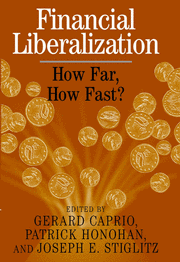Preface
Published online by Cambridge University Press: 12 January 2010
Summary
The widespread financial crises of recent years have all too dramatically illustrated the shortcomings of financial policy under liberalization. The complexity of the issues mocks any idea that a standard liberalization template will be universally effective.
The goal of this volume is to bring a more broad-based empirical experience than has been customary to the theoretical debate on how financial systems should be managed. This is achieved, not only with cross-country econometrics, but also with an account of widely contrasting country cases. The evidence here described confirms that policy recommendations need to take careful account of country conditions.
The volume is the fruit of a research project sponsored by the World Bank's Development Economics Research Group.
Drafts of the chapters were discussed at a workshop at the Bank's headquarters in Washington D.C. The editors are grateful to participants in that workshop and especially to the discussants: Charles Calomiris, David C. Cole, Cevdet Denizer, Barry Johnston, Ed Kane, Don Mathieson, Huw Pill, Betty Slade, Paulo Vieira da Cunha, and John Williamson. A summary of their comments can be found at the Research Group's finance website: http://www.worldbank.org/research/interest/intrstweb.htm. Other readers who provided valuable comments, in addition to those noted in individual chapters, include Sri-Ram Aiyer, Gerard Byam, Lajos Bokros, Stijn Claessens, Jonathan Fiechter, Paul Murgatroyd, Alain Soulard, and Dimitri Vittas as well as Scott Parris and three anonymous referees of Cambridge University Press.
Thanks also to Agnes Yaptenco, whose secretarial and organizational assistance was invaluable, and to Léan Ní Chuilleanáin for editorial support.
- Type
- Chapter
- Information
- Financial LiberalizationHow Far, How Fast?, pp. ix - xPublisher: Cambridge University PressPrint publication year: 2001



